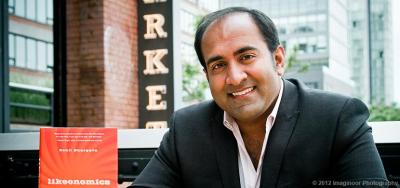You are viewing our site as an Agent, Switch Your View:
Agent | Broker Reset Filters to Default Back to ListWhy Being Liked Matters
November 11 2012
Guest contributor Meg White of REALTOR®Mag says:
 Marketing strategist and author Rohit Bhargava explains the value of likability and why personal bonds may matter more than experience.
Marketing strategist and author Rohit Bhargava explains the value of likability and why personal bonds may matter more than experience.
In your book Likeonomics (John Wiley, 2012), you point out that we make choices based on likability, not always straight-up ability. What would you say to those who find that unfair?
It is unfair. If life were fair, the person who was best on paper would always get the job. But we all know that the world doesn't work that way because people don't make decisions based on logic or as if they were robots. They make decisions based on emotions. There's a lot of new brain science that essentially shows this to be true. Sometimes we do choose the person we have the closer personal bond with, even though maybe that person doesn't have the same amount of experience as someone else.
Real estate professionals may assume strong social ties are always better than weak ones and so may work to strengthen weak ties. Is that a worthwhile endeavor?
Multiple pieces of scientific research actually show that, particularly around job hunting, weak ties are much more valuable to you because they introduce you to people you have no connection to. Also, social media has forced us to redefine what is a strong tie versus what is a weak tie. For example, if I make a decision on whether to buy a product based on a review from someone I don't know on Amazon, is that a strong tie or a weak tie, or is it a tie at all? At the end of the day, it influenced my purchase decision. It's changing the nature of virtual trust versus personal trust. The challenge is that anonymous reviews can influence people's behavior on whether to look for a place in a certain area, whether to trust a certain company or not, or how to price or make offers.
How can real estate professionals and brokerages rewrite some of the negative assumptions the public has about the industry?
Many industries have suffered from this general erosion of trust in institutions. We see it in everything from business to government, even in things that you might have thought to be untouchable in terms of trust, like religion and church. One of the things that I've seen over and over again in the real estate industry, in the financial industry, in the health care industry, is this natural need for people to have someone—a person, and not a company—they can trust. We see this in social media. Companies are trying to become friends with people. People don't become friends with companies. They become friends with people. One of the challenges we're all dealing with is what I call in the book "the modern believability crisis." It's just harder to be believable, no matter who you are.
How can people develop likability without seeming desperate or sappy?
People equate being likable with being nice or being a pushover. I found there's a huge difference between being likable and being nice. Nice people don't tell you the truth, because they want to be nice. Likable people actually will tell you the truth, because that's what you need to hear. If you apply that to the real estate business, the person who shows you a home and tells you truthfully the downside of the home is much more likely to be trusted than the person who says, "Oh, yeah, everything's great. Nothing's wrong." People don't believe that.
You note that analytics often fail to tell the true story web site usage. Short of just sitting next to a person while they navigate your site, how can you tell if your website is useful?
You can look at examples from other industries that you know have huge budgets to figure these things out. I love to look at Amazon, because the number of usability experts and the amount of analytics they have is something nobody else will be able to afford. So if they've figured something out that I can see in their interface and copy, of course I'm going to do that. They've invested a lot of time to try to figure that out, so why wouldn't I just take that lesson for myself and use it? Look at your big competitors. See what they've put out. See what works for them and copy it.
To view the original article, visit REALTOR®Mag.









